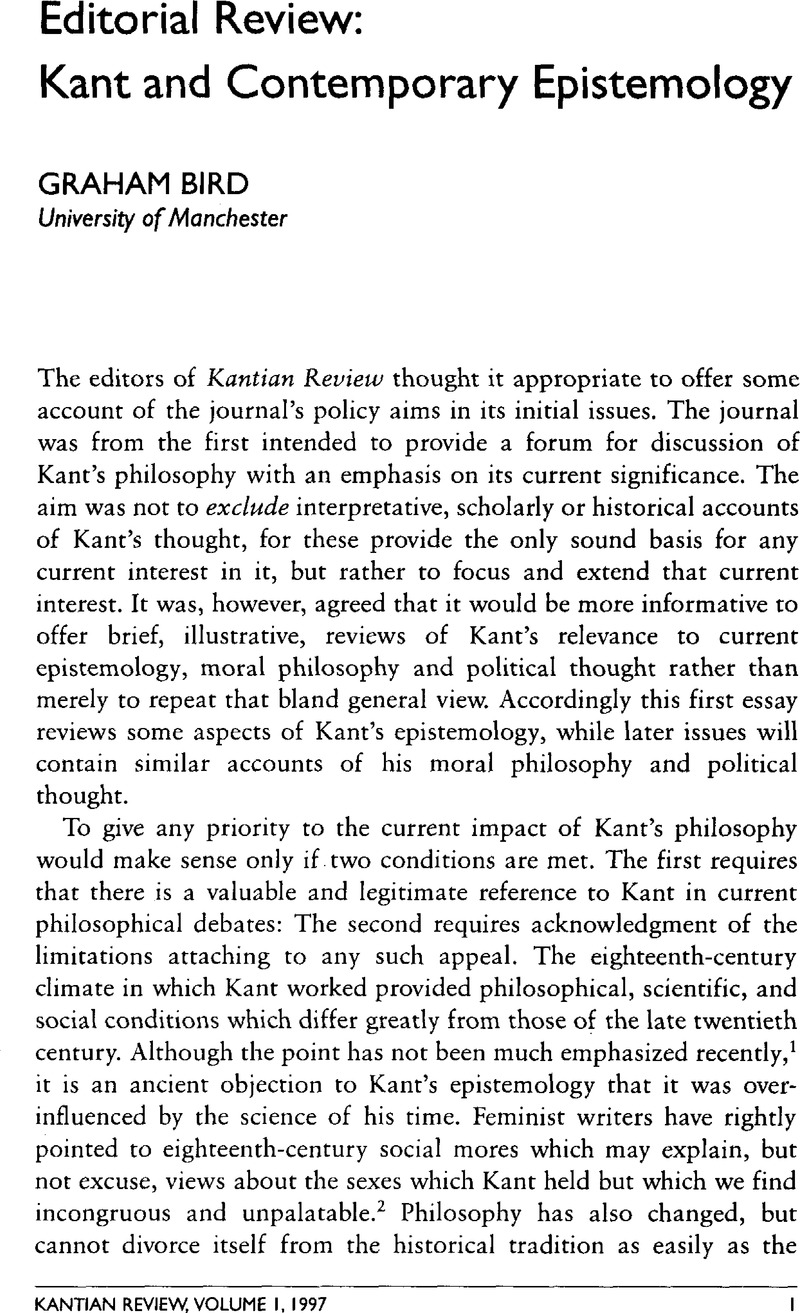No CrossRef data available.
Article contents
Editorial Review: Kant and Contemporary Epistemology
Published online by Cambridge University Press: 27 September 2011
Abstract

- Type
- Editorial Review
- Information
- Copyright
- Copyright © Kantian Review 1997
References
Notes
1 In Parrini, Paolo (ed.), Kant and Contemporary Epistemology (Dordrecht: Kluwer, 1994),CrossRefGoogle Scholar Peter Mittelstaedt, Gordon Brittan, and Vittorio Mathieu offer some defence against this objection. Stefan Körner, however, maintains his long-standing doubt whether Kant can overcome it. The best recent account of that doubt is Friedman's, MichaelKant and the Exact Sciences (Cambridge, MA: Harvard University Press, 1992).Google Scholar
2 For example in Grimshaw, Jean, Philosophy and Feminist Thinking (Minneapolis, Minnesota University Press, 1986)Google Scholar; Pateman, Carole, The Sexual Contract (Stanford, CA: Stanford University Press, 1988),Google Scholar and Herman, Barbara, ‘Could it be worth thinking about Kant on sex and marriage?’, in Antony, L. and Witt, C., A Mind of One's Own (Boulder, Westview Press, 1993).Google Scholar
3 Several philosophers, such as Heidegger, Deleuze, Putnam and Strawson, have been strongly influenced by Kant in their own independent work.
4 I treat Russell as a representative of a general trend against the tradition at the end of the nineteenth and start of the twentieth century. Many others, such as William James, Moritz Schlick, G. E. Moore, and E. Husserl played a part.
5 Logic and Knowledge, ed. Marsh, R. C. (London: Allen and Unwin, 1956), p.324.Google Scholar
6 ‘Logical Atomism’, ibid., p.324: Russell says that ‘stock philosophical arguments about mathematics (derived in the main from Kant) had been rendered invalid by the progress of mathematics’. But the later History of Western Philosophy showed the same hostility.
7 See Bradley, F. H., Appearance and Reality (Oxford, 1893Google Scholar), ch.2.
8 See Russell's, ‘Lectures on the philosophy of Logical Atomism’, Monist (1918–1919)Google Scholar, reprinted in Logic and Knowledge, and The Problems of Philosophy (London, 1912). Russell's revolution was one mainly of method, but his agenda and problems remained traditional.
9 Wittgenstein even in his Tractatus phase wanted to go beyond Russell, and his later philosophy must have seemed to Russell even more revolutionary and was generally recognized as such. Austin's and Ryle's revolutionary aspirations have been less generally appreciated. See my entries on both in Dancy, Jonathan and Sosa, E. (eds.), A Companion to Epistemology (Oxford: Blackwell, 1992), 34–6Google Scholar and 452–4. Rorty, 's rejection of the tradition is evident in such works as Philosophy and the Mirror of Nature (Oxford: Blackwell, 1980)Google Scholar and Contingency, Irony, and Solidarity (Cambridge: Cambridge University Press, 1989).
10 McDowell, J., Mind and World (Cambridge, MA: Harvard University Press, 1994).Google Scholar
11 Strawson, P. F., Individuals (London: Methuen, 1959),CrossRefGoogle Scholar and Scepticism and Naturalism (London: Methuen, 1985). It would be wrong to assume that Strawson's conception of descriptive metaphysics was the same as Kant's; even the later work although closer to Kant still differs from him at some points. See also ‘The problem of realism and the a priori’ in Parrini (ed.), Kant and Contemporary Epistemology.
12 Kant's relation to cognitive science has been explored in Kitcher's, PatriciaKant's Transcendental Psychology (Oxford: Oxford University Press, 1990),Google Scholar and Brook's, AndrewKant and the Mind (Cambridge: Cambridge University Press, 1994).CrossRefGoogle Scholar
13 The Bounds of Sense, ‘The metaphysics of transcendental idealism’, pp. 235–76. Mind and World, p.41.
14 I think Guyer, Paul is at least in danger of this in his Kant and the Claims of Knowledge (Cambridge: Cambridge University Press, 1987), pp.333–44.CrossRefGoogle Scholar I discuss the passage in ‘Tradition and revolution in Kant’, Proceedings of the Eighth International Kant Congress (Memphis: Marquette University Press, 1995), pp.1119–36.
15 Kripke's, S.Naming and Necessity (Oxford: Oxford University Press, 1980)Google Scholar developed a classification scheme in his account of modal logic which has more in common with Kant's scheme than either the empiricists' restriction to a simple ‘analytic/synthetic’ division, or a Quinean rejection of that distinction. Current interest in ‘transcendental arguments’ is not simply a domestic issue for those interested in Kant.
16 See, for example, Fodor, J. and LePore, E., Holism: A Shopper's Guide (Oxford: Blackwell, 1992).Google Scholar
17 In Quine, W. V. O., From a Logical Point of View (Cambridge, MA: Harvard University Press, 2nd edition, 1964).Google Scholar
18 Quine, W. V. O., Word and Object (Cambridge, MA: MIT Press, 1960).Google Scholar
19 Word and Object, pp.73–9. There Quine denies that the field linguist's resolution of his problems is ‘capricious’, but insists on the limitations imposed by his choice of analytical hypotheses, namely that there is no ‘fact of the matter’. See Fodor and LePore, Holism, for criticism of Quine's views, and Antony, Louise, ‘Meaning and semantic knowledge’, Aristotelian Society, Supplementary volume 71 (1997).Google Scholar
20 The contributions cited earlier, n.l, from Parrini (ed.), Kant and Contemporary Epistemology, discuss the issue. See also Friedman, Michael, ‘Kantian themes in contemporary philosophy’, to appear in the Aristotelian Society Supplementary Volume 72 (1998).Google Scholar Friedman argues for the inseparability of Kant's epistemology from his eighteenth-century conception of science, and connects this to a Quinean ‘naturalized epistemology’.
21 Richard Rorty's rejection of a traditional epistemology and of any conception of truth as correspondence can be seen as a response to a Quinean position. See, for example, his ‘The contingency of language’ in Contingency, Irony, and Solidarity (Cambridge: Cambridge University Press, 1989).Google Scholar There Davidson's treatment of truth is applauded as ‘the first systematic treatment of language which breaks completely with the notion of language as adequate or inadequate to the world’ (p.10).


